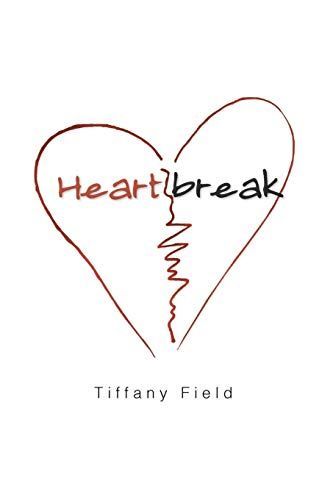
Heartbreak
Tiffany M. Field, PhD, is director of the Touch Research Institutes at the University of Miami School of Medicine. She is recipient of the American Psychological Association Distinguished Young Scientist Award and has had a Research Scientist Award from the NIH for her research career. She is the author of Infancy, The Amazing Infant, Touch, Advances in Touch, Touch Therapy, Massage Therapy Research, and Complementary and Alternative Therapies, the editor of a series of volumes on High-Risk Infants, and on Stress & Coping, and the author of over 450 journal papers. In the book Heartbreak she has reviewed recent research including her own studies on the heartbreak phenomenon as well as the symptom of social-emotional pain, intrusive thoughts, dreams and insomnia, crying, loneliness, depression, anxiety, and anger and the various therapies for heartbreak, as well as chapters on recovery, forgiveness and finding love again. The appendices to her book include several writing exercises for recovering and quotes from recommended books. Her introduction reads as follows: "It's been 9 months since I was dumped, and I am still wracked with and reeling from pain. I tried psychotherapy, I tried reading all the I was dumped', Heartbreak' and Love Addiction' books, I tried writing lost love poems, I tried reading Nora Roberts and Danielle Steele novels and I tried seeing Sex and the City' and He's Just Not That Into You' type movies. All of these must have helped a bit because I kept doing them almost obsessively and compulsively. I also have been working-out 3 hours a day which probably helps the most, and I took a beachside holiday with my daughter which was real therapy. But, I am still plagued by intrusive thoughts every moment of the day every day of the week, and by waking up many times in the night thinking this was just a nightmare and not for real, and wandering around looking for him, and having frequent, unpredictable bouts of heartache and embarrassingly uncontrollable crying spells, and not being able to listen to music or watch T.V. and not even being able to eat eggs which was our favorite meal, and having to turn off my cell phone because I keep expecting his 10 times- a day phone calls. So, I decided I would try something that has worked for me in past "being dumped" episodes which was researching the subject and then writing about it. The scientific research is very limited, even though heartbreak dates back to pre-historic times. They say that even rats experience heartache-I am not sure about dinosaurs as the data are limited from those times. It is also surprising that the research is scarce given that heartbreak has been one of the most popular themes for novelists and poets in historic times. It probably relates to the fact that researchers need funding for their research, and the funding agencies don't usually have these universal experiences that can kill you like love and heartbreak high on their priority lists. A renowned Wisconsin Senator was quoted once as saying Why would we need research on love when everyone knows what love is'. Data are recently accruing on the symptoms and longer term effects of heartbreak or the broken heart syndrome'. What little scientific literature there is on underlying biochemical, physiological and neurophysiological mechanisms of heartbreak shows that different parts of the brain light up on fMRIs during heartbreak, and some therapeutic activities can reduce the symptoms. Those data are important because they suggest potential physical damage from persistent, unrelenting heartache and the need for freeing yourself and moving on. So, this book is an attempt to let you know those data. It is not a therapeutic book like Eat, Pray and Love' and it is not a humorous book like He's Just Not That Into You'. But it hopefully is informative about the broken heart syndrome' and ways to work on a cure for that syndrome to hopefully never experience it again soon. Heartbrea